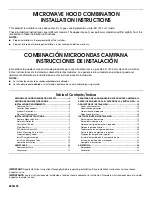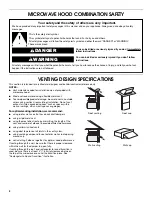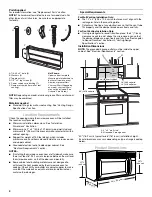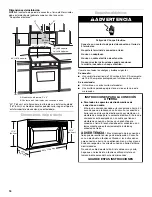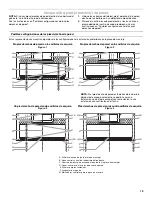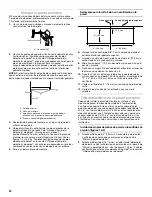
9
Attach Mounting Plate to Wall
NOTE: Secure the mounting plate to the wall at all 4 corner holes
drilled into the wall studs and/or drywall using either 1/4-20 x 3"
round-head bolts and toggle nuts or 1/4 x 2" lag screws.
Refer to illustrations in “Possible Wall Stud Configurations” in
“Locate Wall Stud(s)” section.
No Wall Studs at Corner Holes (Figures 1 & 2)
NOTE: The mounting plate must also be secured to the wall on at
least 1 wall stud as well as at all 4 corners.
1. With the support tabs of the mounting plate facing forward,
insert 1/4-20 x 3" round-head bolts through all 4 corner holes
of mounting plate.
2. Start toggle nuts on bolts from the back of the mounting plate.
Leave enough space for the toggle nuts to go through the wall
and open.
3. Position mounting plate on the wall, making sure that the top
of the mounting plate is aligned with the front edge of the
upper cabinet.
4. Push the 4 bolts with toggle nuts through the drywall, and
finger tighten the bolts to make sure toggle nuts have opened
against drywall.
5. Insert lag screw(s) into the holes drilled into wall stud(s) in
Step 2 of “Installation for No Wall Studs at Corner Holes” in
the “Drill Holes in Rear Wall” section.
6. Check alignment of mounting plate, making sure it is level.
7. Securely tighten all lag screws and bolts.
One Wall Stud at Two Corner Holes (Figure 3)
1. With the support tabs of the mounting plate facing forward,
insert 1/4-20 x 3" round-head bolts through the 2 corner holes
that fit over the two 3/4" (19 mm) holes drilled in Step 2 of
“Installation for One Wall Stud at Two Corner Holes” in the
“Drill Holes in Rear Wall” section.
2. Start toggle nuts on the bolts from the back of the mounting
plate. Leave enough space for the toggle nut to go through
the wall and to open.
3. Position mounting plate on the wall, making sure that the top
of the mounting plate is aligned with the front edge of the
upper cabinet.
4. Push the 2 bolts with toggle nuts through the drywall, and
finger tighten the bolts to make sure toggle nuts have opened
against drywall.
5. Insert 2 lag screws into the remaining 2 corner holes.
6. If installing on a second wall stud, insert lag screw(s) into the
other hole(s) drilled in Step 2 of “Installation for One Wall Stud
at Two Corner Holes” in the “Drill Holes in Rear Wall” section.
7. Check alignment of mounting plate, making sure it is level.
8. Securely tighten all lag screws and bolts.
Wall Studs at All Four Corner Holes (Figure 4)
1. Position mounting plate on the wall, making sure that the top
of the mounting plate is aligned with the front edge of the
upper cabinet.
2. Insert lag screws into the 4 corner holes.
3. Check alignment of mounting plate, making sure it is level.
4. Securely tighten all lag screws.
Prepare Upper Cabinet
1. Disconnect power to outlet.
2. Remove all contents from upper cabinet.
3. Place Upper Cabinet Template against the bottom of the
upper cabinet, and attach with tape or thumbtacks. Make sure
the template centerline aligns with the vertical centerline on
the rear wall.
The “rear wall” arrows must be against the rear wall so that the
holes cut into the upper cabinet align with the holes in the top
of the microwave oven.
NOTE: If the upper cabinet has a frame around it, trim the
template edges so that it fits inside the frame, against the upper
cabinet bottom. The template has trim lines to use as guides.
4. Make sure the 10
⁷⁄₁₆
" (26.5 cm) dimension from the rear wall to
points “D” and “E” on the template is maintained.
A. 1/4-20 x 3" round-head bolt
B. Mounting plate
C. Spring toggle nut
A. 1/4-20 x 3" round-head bolt
B. Mounting plate
C. Drywall
D. Spring toggle nut
C
A
B
A
B
C
D
D
E
G
Uppe
r-cabinet temp
l
at
e
F
10
⁷⁄₁₆
"
(26.5 cm)
10
⁷⁄₁₆
"
(26.5 cm)

